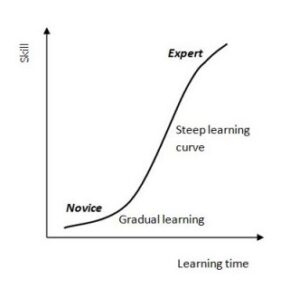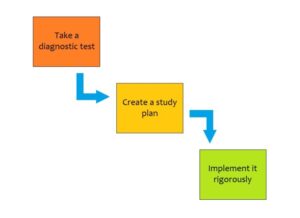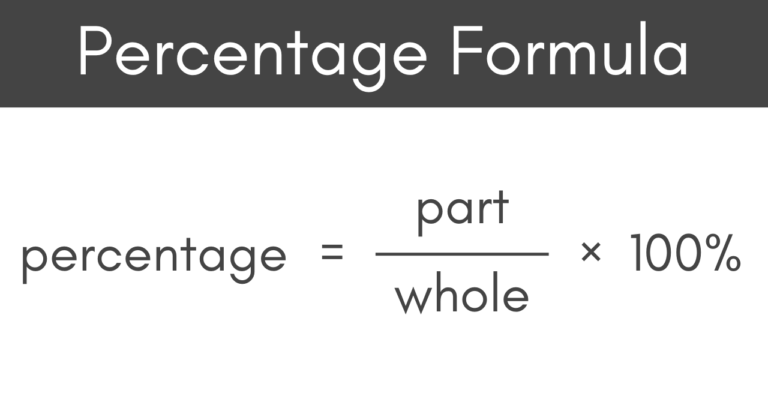GMAT preparation – how long does it take?
How long does it take for GMAT preparation?
This is one of the most common questions everyone has regarding GMAT preparation. Unfortunately, it isn’t the right question. The right question should have been:
“How long would it take ‘me’ to prepare for the test?”
Just like any other skill, this takes time to learn. No size fits all – how much time you will take depends on these factors:
- Learning curve – Which part of the learning curve you are currently in
- Efficiency – How efficient is your learning process
- Tools – Whether you are using the right tools (materials and practice questions) for your prep

Determine the time you need for your GMAT preparation
Take a diagnostic test. You can use our “mini GMAT diagnostic” for a start. We will divide the result in 3 categories based on your score:
- 500 or lower – average prep time to reach 700+ is 5-8 months
- Between 500 and 600 – average prep time to reach 700+ is 3-5 months
- Between 600 and 650 – average prep time to reach 700+ is 1-3 months
A more detailed estimate is shown below (note that these are average values):

The above estimates do not consider your education background. For example, a student from a mathematics background might score poorly in the diagnostic (possibly because he has forgotten many things) but can learn the QA concepts very fast and score well in a mock test later – it may take him hardly a month to cover all the concepts. Such exceptions aside, the above is a general guideline of the amount of time you would need to invest.
When I say that the time taken is 1 month or 2 months, etc., I need to provide more clarity on how much time you actually spend for your GMAT preparation. Do you study 10 hours every day? No!
You need to put in approx. 2 to 2.5 hours each day of a week with one or two days as off-days. So, that makes approx. 8 to 12 hours in a week – around 40-45 hours per month. Thus, to move up from 500-600 score to 700-750 score, for example, you possibly require around 3 months – that’s 120-135 hours approx.
The GMAT preparation process
The test preparation process includes the following:
- Attend lectures (if you have joined any test-prep institute or taking help from someone)
- Review the concepts (or learn the concepts if you are doing self-study)
- Apply the concepts learnt in solving questions of various difficulty levels
- Apply different strategies and fine-tuning the process
- Write mock tests (the recommended number is 4-5)
- Analyze the mock tests and filling up the learning gaps if any
- Also prepare for the IR and the AWA sections

Students often think cramming for more number of hours in a shorter span would enable them to prepare for the test faster. So why not prepare for 4-5 hour every day and complete the prep in one-third the time? – Simply because it doesn’t work that way. All good things take time!
Unless your foundation is strong, you can’t build anything on top of that. Getting your foundations strong, i.e. your concepts in place, needs time. You can’t fast-track it beyond a certain limit – you won’t be able to retain anything.
Remember, the GMAT is NOT a test of your memory. It is a test of certain skills – comprehension, quantitative ability, language skills, etc. These take time to develop unless you are already at a particular level (the exceptions I was talking about earlier).
There is another point which I want to discuss here. Many students have a common misconception regarding Q-scores and V-scores. They feel that a Q43, for example, means you are almost made it to the top while a V30, for example, is not so good a score. It is not true! In fact, V30 and Q43 correspond to very similar percentiles – around 60 percentile in each case. Moving up from Q43 to Q49 is similar to moving up from V30 to V36. To get 700 overall, the approx. scores required vary from V35 & Q51 to V42 & Q45 (very people score beyond V42).
The next steps in planning your GMAT preparation
Preparing for the GMAT is demanding. To make sure you can cope up with the rigors and not end up frustrated or fatigued, follow the steps below:
- The first thing you should do is to make a schedule that would be possible for you to follow consistently.
- Do not necessarily study at a stretch. If possible, break up the time (approx 2 to 2.5 hours / day) into slots of 45-60 minutes. Keep each slot for a particular subject / topic depending on your preferences (for example, you may prefer preparing for Verbal in the morning and for Quant in the evening)
- Don’t cram – keep applying what you learn by solving questions based on that concept immediately after you learn
- Keep revising concepts that you have studied earlier
- Take a break for a few days in between if you feel fatigued – but make sure that you come back and start the process once you feel refreshed
Remember – You have to follow the process. Consistency is the key.
Hope this helps! You have got a good idea about how to plan your GMAT preparation.
Have questions? Call us for a free consultation regarding your career moves – be it MBA in India or study abroad programs through GMAT or GRE. Call us: +91 9433063089







